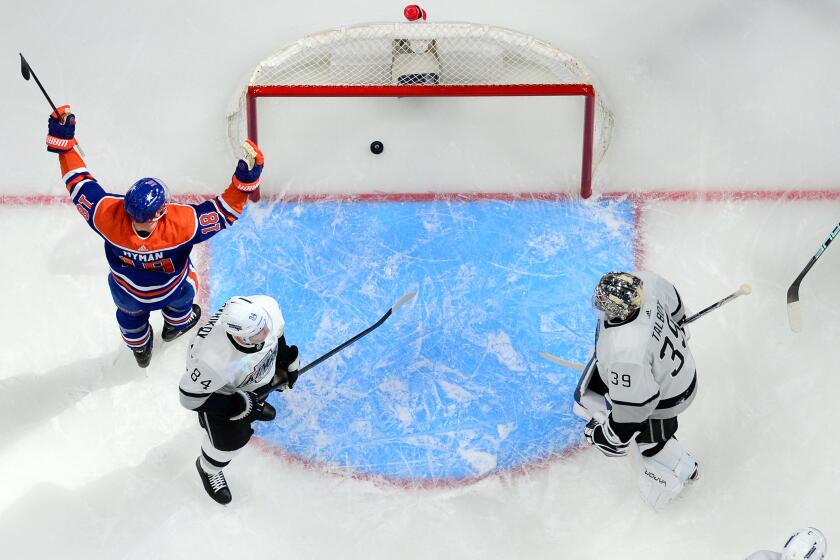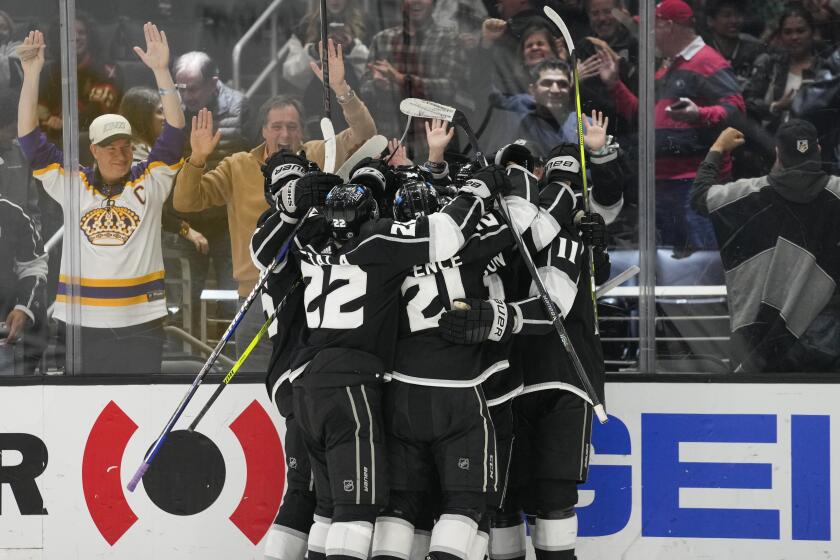Rangers’ lawsuit against the NHL casts a big web
It is akin to “man bites dog” when the owner of a sports team files an antitrust lawsuit against the very league he has spent millions of dollars to join.
So eyebrows understandably were raised in sports business circles last month when Madison Square Garden, which owns the New York Rangers, alleged in a federal lawsuit that its fellow NHL franchise owners were acting “like an illegal cartel.”
The league’s alleged offense? Conspiring to co-opt revenue being spun off by new media business ventures, including a website that the Rangers developed to connect with fans.
The lawsuit deals with a new media issue but is driven by an age-old concern: How much local control can a cash-hungry team owner exert when it comes to a league rule that, at least in theory, is designed to benefit a majority of the owners?
“This is not some dry, historical discussion,” said Daniel E. Lazaroff, director of Loyola Law School’s Sports Law Institute. “I’m going to be teaching this very case . . . because it’s cutting edge. . . . And if it’s not settled quickly, it’s going to be very interesting to see how it plays out.”
Madison Square Garden isn’t the first owner to break ranks.
Years ago, Oakland Raiders owner Al Davis and former New England Patriots owner Victor Kiam alleged antitrust violations when the NFL refused to allow them to move their franchises. More recently, Yankees owner George Steinbrenner filed suit against Major League Baseball over a potentially lucrative apparel deal that was at odds with league policy.
The NHL on Friday filed an initial response that asks a federal court in New York to reject Madison Square Garden’s demand for a preliminary injunction that would keep the league from taking over the Rangers’ website -- and stop the league from imposing a $100,000-per-day fine. The filing also linked the lawsuit to “the sour grapes of one disgruntled NHL team owner.”
The league filing included supporting statements from Washington Capitals owner Ted Leonsis, Minnesota Wild Chairman Bob Naegele and Pittsburgh Penguins Chief Executive Ken Sawyer -- all supporters of the league’s new media plan.
Should the Rangers prevail, Lazaroff and other observers said, it could serve as a test case for sports leagues as they consolidate control over online activities and other new media opportunities. The lawsuit also could shape future disputes between individual owners and leagues.
The Rangers are challenging an NHL plan to take control of team websites and some other advertising, marketing and retail opportunities. NHL owners voted overwhelmingly last year to turn website operations over to a central league office -- and, not surprisingly, the Madison Square Garden group was one of the three dissenters.
The lawsuit filed Sept. 26 in a New York federal district court claims that the new media plan created in the wake of that vote is “flawed,” and that the league already is $12.6 million behind in its revenue projections. Madison Square Garden Chairman James Dolan argues that the Rangers should be free to use online revenue to market the team in a city where fans have plenty of entertainment alternatives every night of the week.
Madison Square Garden, in a written statement, described the Rangers as “a proud member of the National Hockey League.” But the statement also referred to “significant disagreements over a number of business-related issues, including a fundamental conflict over which entity owns and controls the business of our franchise. . . . We are asking the court to clarify the boundaries of League rights so we can put this issue behind us.”
The Kings and Ducks, along with most other NHL franchises, declined to discuss the lawsuit.
Antitrust experts suspect that the NHL will either demand that the lawsuit be dismissed, or argue that the league, because of the way it is structured, is exempt from certain elements of antitrust law. “If the NHL can convince a judge that it should be treated as a single entity, then the case will get dismissed,” Lazaroff said, because “if that’s the case, then there’s no conspiracy.”
The Rangers lawsuit boils down to whether the NHL’s bid to operate team websites is an illegal action or a common-sense business decision that will benefit the broad majority of owners, one antitrust attorney said. By extension, he added, the league could argue that the new media plan will benefit hockey fans because it is part of a concerted effort to share revenue among franchises to foster parity on the ice.
Hockey isn’t the only sport in which some teams grumble that their pockets are being picked.
“There’s a lot of concern, in particular among teams in larger markets, about having a league’s central office appropriate any revenue source,” said Andrew Zimbalist, a sports economist at Smith College.
The NHL’s new media plan seems to mirror what other sports leagues have set in motion or are contemplating.
MLB opted for a centrally operated website plan in 2000 when franchise owners voted unanimously to create the Advanced Media division that now is seen as an industry leader. MLB generally flows content and advertising through this division, giving its websites a uniform appearance and giving potential advertisers one-stop shopping.
One measure of the online importance: MLB is expected to sell 27 million of its 80 million tickets this year through its websites.
The NFL is believed to be moving toward the MLB model.
“If you aggregated the 32 teams and NFL.com together, the scale is there” to attract advertisers, said Brian Rolapp, NFL senior vice president of media strategy.
--
More to Read
Go beyond the scoreboard
Get the latest on L.A.'s teams in the daily Sports Report newsletter.
You may occasionally receive promotional content from the Los Angeles Times.






